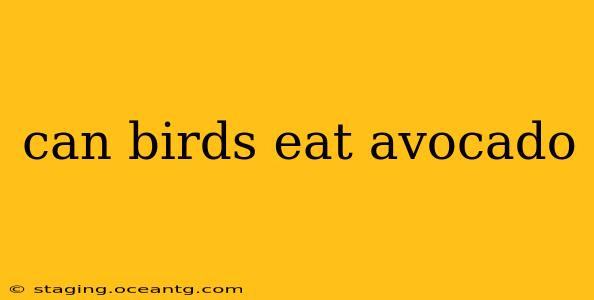Avocados are a delicious fruit for humans, but are they safe for our feathered friends? The short answer is no, birds should not eat avocados. While the creamy texture might seem appealing, avocados contain persin, a fungicidal toxin that can be harmful, even fatal, to birds. This article will delve deeper into the dangers of avocado consumption for birds, exploring the effects of persin and offering safer alternatives for avian treats.
What is Persin and Why is it Harmful to Birds?
Persin is a toxin found in various parts of the avocado plant, including the fruit, leaves, bark, and seeds. While mammals, including humans, can generally tolerate small amounts of persin, birds are far more sensitive to its effects. The exact mechanism of persin's toxicity isn't fully understood, but it's known to cause severe digestive upset, respiratory problems, and even heart failure in birds. The level of persin varies depending on the avocado variety and its ripeness, meaning even a small amount can pose a significant risk.
What Happens if a Bird Eats Avocado?
The symptoms of avocado poisoning in birds can vary depending on the amount consumed and the bird's size and overall health. However, some common signs include:
- Vomiting: The bird may regurgitate its food, often showing signs of distress.
- Diarrhea: Loose or watery droppings can indicate digestive upset.
- Lethargy: The bird may appear unusually sleepy or weak.
- Difficulty breathing: Respiratory issues can range from mild coughing to severe respiratory distress.
- Congestion: The bird may experience nasal congestion or sneezing.
- Heart problems: In severe cases, persin can lead to heart failure.
If you suspect your bird has ingested avocado, it's crucial to seek immediate veterinary attention. Early intervention can significantly improve the chances of a successful recovery.
What are the Safe Alternatives to Avocados for Birds?
Fortunately, there are many other healthy and delicious treats you can offer your bird. Some safe and nutritious options include:
- Fruits: Apples (without seeds), berries (in moderation), bananas, and melon are generally safe choices. Always remove pits and seeds.
- Vegetables: Cooked sweet potato, carrots, and broccoli (in small amounts) can provide valuable nutrients.
- Seeds and Nuts: Sunflower seeds, pumpkin seeds, and small amounts of unsalted nuts (like almonds or walnuts) can be offered occasionally.
- Commercial Bird Food: A balanced commercial bird food provides all the necessary nutrients your bird needs.
Can Different Types of Birds Tolerate Avocado Better Than Others?
No, there's no evidence suggesting that certain bird species are more resistant to persin than others. The toxin poses a risk to all birds, regardless of their size or species. It’s best to err on the side of caution and completely avoid giving avocados to any bird.
My Bird Ate Avocado, What Should I Do?
If your bird has ingested avocado, contact an avian veterinarian immediately. Describe the amount of avocado consumed and observe your bird closely for any symptoms. The vet will be able to assess the situation and provide appropriate treatment. Time is of the essence in cases of avocado poisoning.
Is Avocado Toxic to All Parts of the Bird?
Yes, all parts of the avocado – the fruit, pit, skin, and leaves – contain persin and are potentially toxic to birds. Even small amounts can be harmful. Therefore, it’s crucial to keep avocados completely out of reach of your bird.
By understanding the dangers of avocados for birds and providing them with safe and nutritious alternatives, you can ensure their health and well-being. Remember, prevention is key. Keep avocados out of reach and always choose safe treats for your feathered friend.
